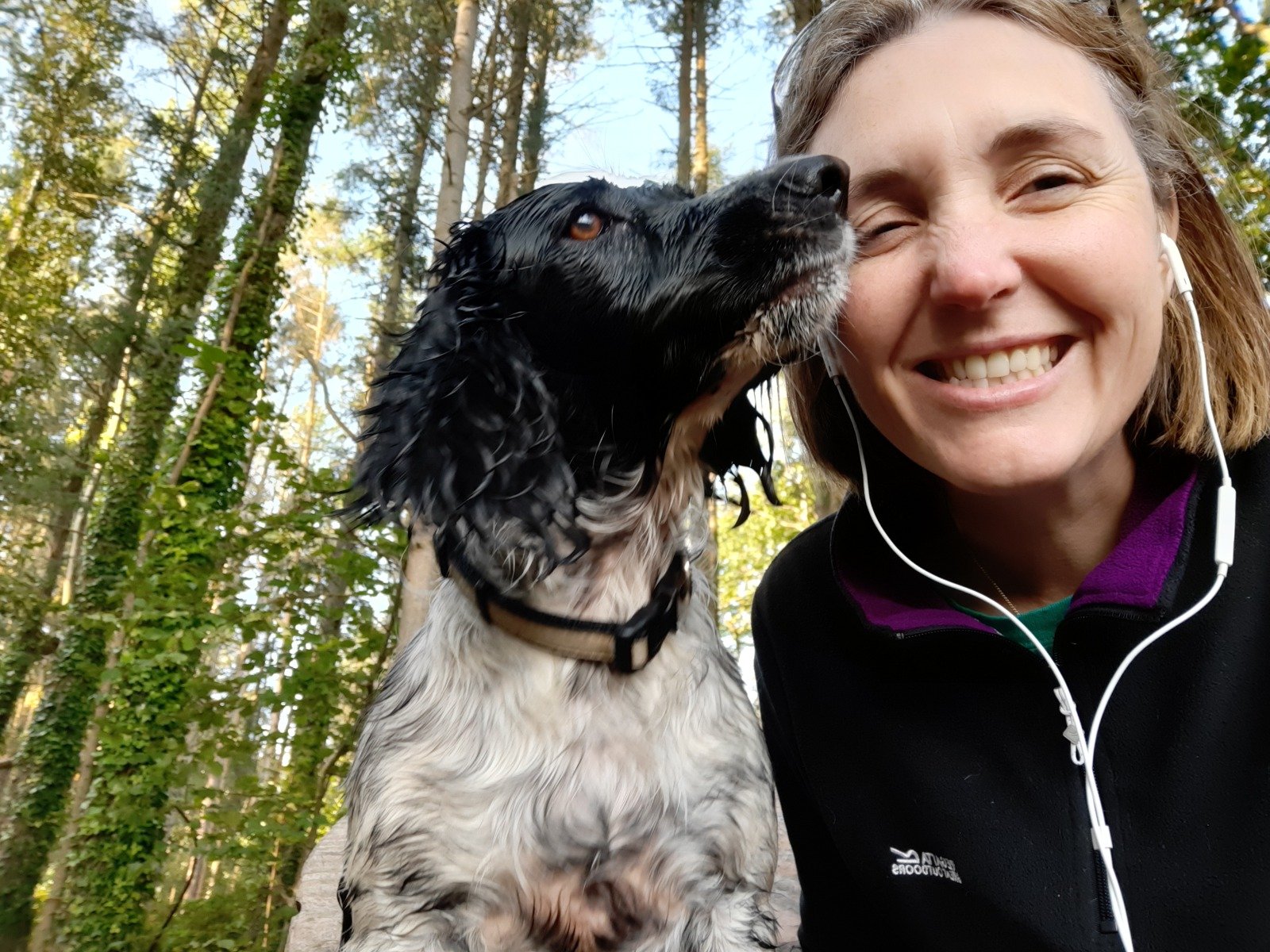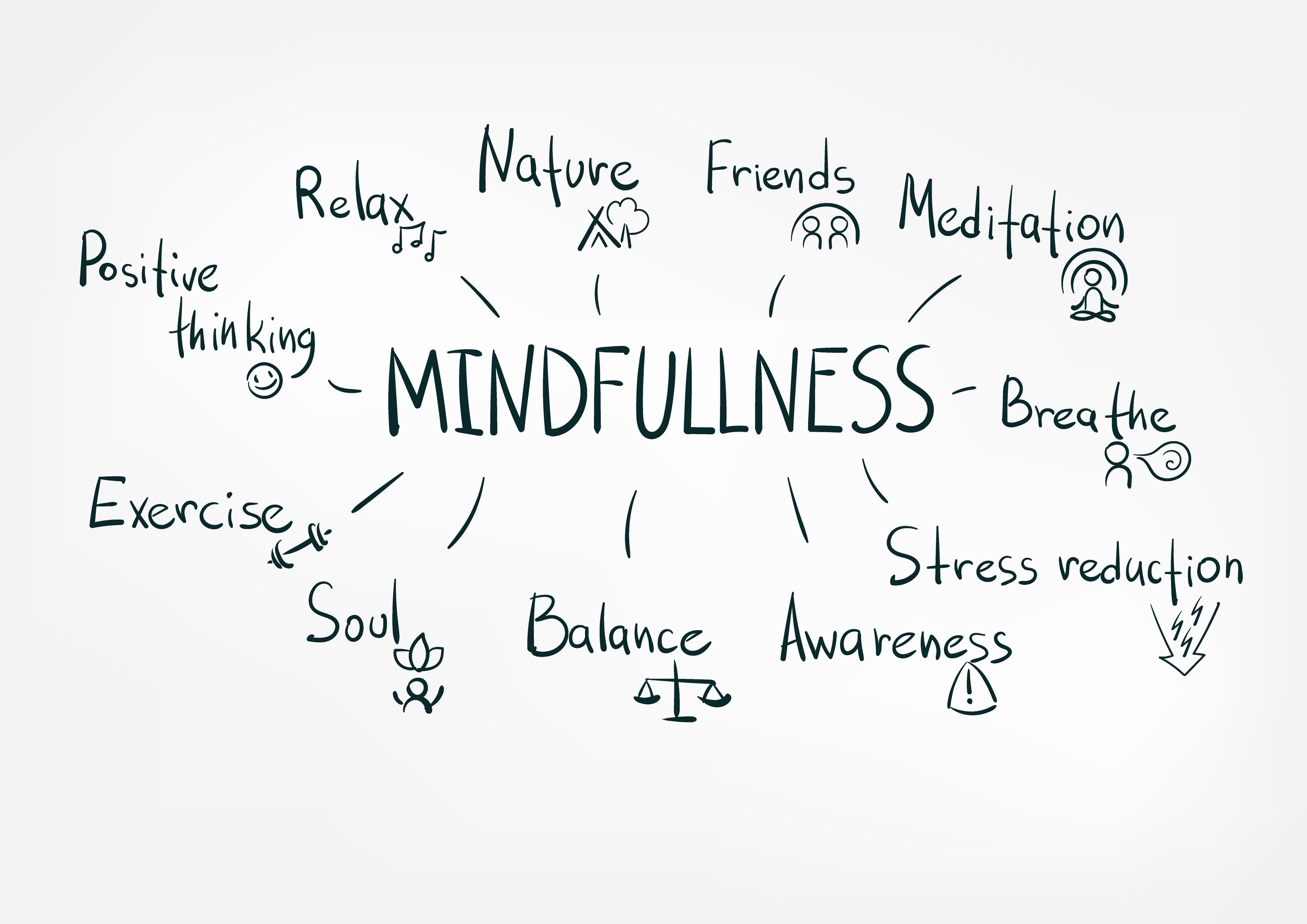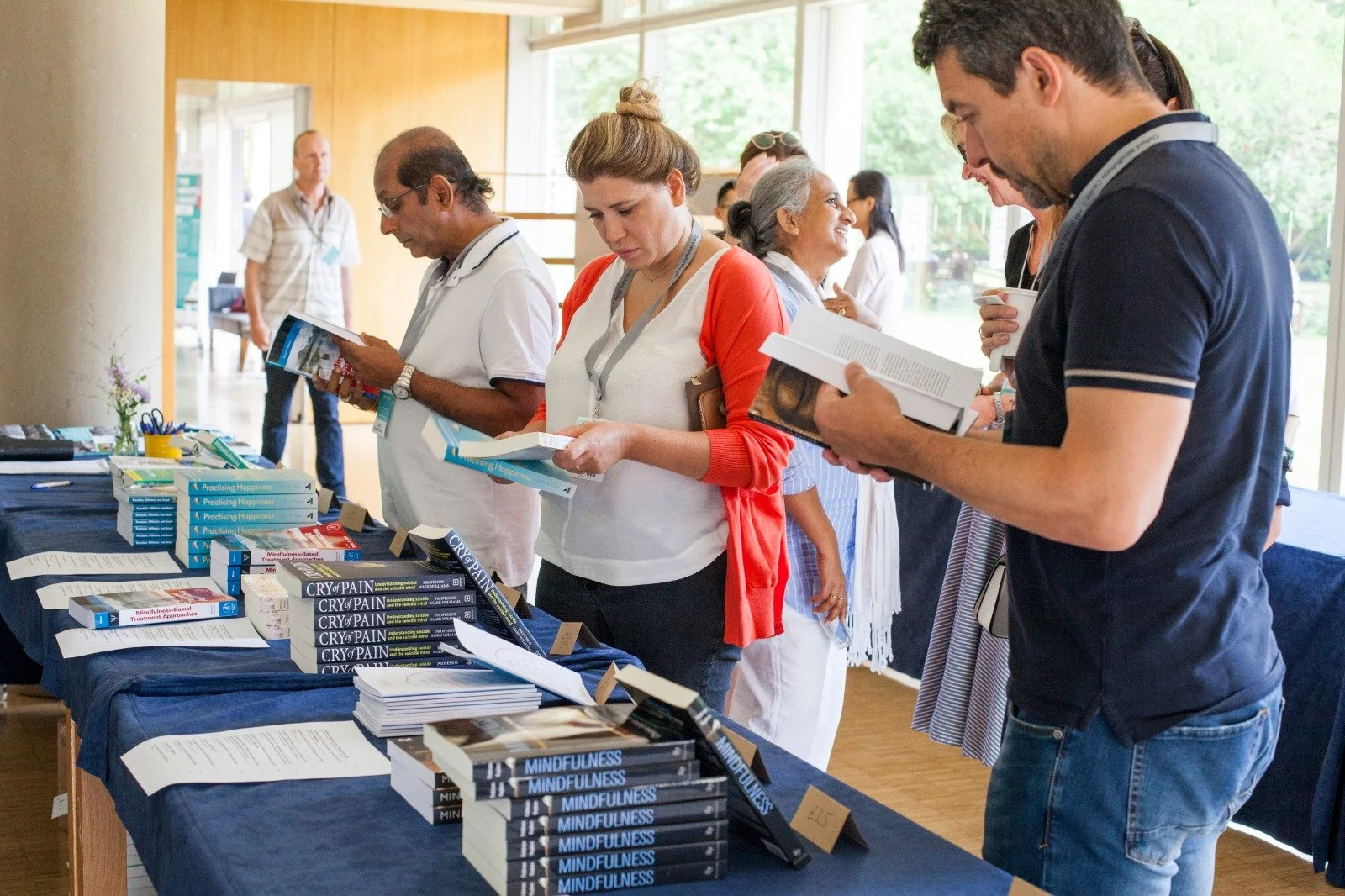London Grilling: Sharon Hadley, Oxford Mindfulness Foundation.
This week we’ve brought you a very special Sunday blog post that shines a light on mindfulness, the ancient wisdom of meditation which helps people live life more fully and with a greater sense of perspective.
Thank you to Sharon Hadley, CEO of the Oxford Mindfulness Foundation, for talking to London Living all about OMF, how she came to work within the mindfulness space and for her tips on how to be more mindful whilst living in a fast-paced city such as London!
Scroll down to read our inspiring London Grilling with Sharon Hadley.
Sharon with her beloved dog Bella.
Hi Sharon, tell us a little bit about yourself.
I live in North Wales in a quiet seaside town. As a mum of two teenagers, I’m learning through them the challenges of growing up in these ever-changing times! My role as Chief Executive Officer for the Oxford Mindfulness Foundation (OMF) takes me all over the world (virtually and in-person) to collaborate with universities, businesses and individuals to explore the use of evidence-based mindfulness as one of the available resources to support societal mental health. I’m also rather anti-social at the moment, any spare time I have, you’ll find me hidden away writing. I’m in the final stages (thankfully!) of my part-time Health Economics PhD, evaluating the impact and cost-effectiveness of mindfulness in the workplace.
How did you come to be involved in mindfulness professionally?
I joined the mindfulness team at Bangor University in 2011, totally by accident. At that point in time, mindfulness was becoming more prevalent outside of the healthcare sector and the Bangor team were looking for an Office Manager to help them meet the demand, I was looking for a new job and thought I’d submit an application and see what happens. I had no prior experience of mindfulness but lots of experience in running businesses and charitable operations. Apparently, I only just beat another candidate to get the job and I’m forever grateful – it has been an amazing journey so far. Although I’ve personally attended many courses, I don’t teach mindfulness myself. I’m very much a business person in the mindfulness world and I think that is where I can really add value. I spend a lot of time supporting others to set up centres and deliver programmes in collaboration with the OMF - behind the scenes enabling others to deliver the teaching is my ‘happy place’. Being around mindfulness teaching and training has honestly had a profound impact on how I live my life, how I raise my children and generally interact with loved ones and all others. For me, the importance of mindfulness has been learning that I have a choice to pause in moments of difficulty, to respond rather than simply react which has brought about a sense of calm (not total serenity of course!) into my life which really crept in without intention, it just happened by being in this space.
What is the story behind the creation of Oxford Mindfulness Foundation?
The OMF charity was set up in 2007 with Professor Mark Williams as founding Director. It was established to support the University of Oxford’s research in mindfulness, to set up mindfulness courses for NHS patients and the general public, and to train new mindfulness teachers in the UK and abroad. The demand for OMF services has since continued to expand with the OMF growing into the independent international charity it is today. The University of Oxford’s Department of Psychiatry has collaborated closely with the Foundation since its inception and the charity retains a close affiliation with the university. Partnerships have been extended over the years with other international universities, such as Hong Kong, Mexico, Greece, Portugal and Singapore and we have also developed working relationships with major international companies in the technical, banking and healthcare sectors.
Who is the Oxford Mindfulness Foundation for?
The OMF is there for everyone! If you are curious as to what mindfulness is, we offer free information sessions where you can ask questions and even try a bit of meditation. If you remain curious, you can join free weekday evening practice sessions. If you want to give mindfulness a chance to make a change in your life, you can join one of our online courses. Then, if you are really interested you can train to teach mindfulness with our online, part-time 12-month programme. We also offer free monthly keynotes on the first Wednesday of the Month and free month social evenings with music, comedy, poetry etc on the last Friday evening of the month. If you are interested in research in the field, we share research findings on our social media channels weekly, if you are interested in governance in the field, we have a page of policies and procedures, guiding ethical principles etc for you to better understand the professional standards of the field. So there really is a wide range of things to interact with for those with different interests in mindfulness.
What does mindfulness mean and why should we all be practicing it?
Ah well, I don’t think we ‘should all’ be practicing it. It’s always a personal choice and like anything we choose to do, it’s not for everyone. I believe we ‘should’ be taking our mental health seriously but how we do that is a personal choice. Take the gym.. not everyone wants (or should) go to the gym, however the benefits of taking care of our physical health are pretty much universally agreed. Some people go to the gym, some go swimming or walking etc, all with the end goal of keeping physically healthy. What I hope for is that mental health could be seen in the same way, accepted in society the same as physical exercise. To look after our mental health, some people may choose mindfulness, others might opt for some other form of intervention.
Mindfulness is one of those words with many descriptions, there are some commonly used definitions such as ‘paying attention (to what’s happening) in the present moment, non-judgementally’, I describe mindfulness as a way of being, supported by a secular mediation practice which can be integrated into our everyday lives to foster mindful behaviours.
Some people adopt more structured practices by ‘formally’ meditating, others have a more ‘informal’ practice and pay attention to things that may otherwise pass them by. Examples of informal practice could be noticing the beautiful buildings in London (which attract thousands of visitors each year), really appreciating them on the commute into work or the shops. Or paying attention to the rising anger when someone says something that might be insensitive, and making a choice how to respond, not simply reacting.
Image: www.oxfordmindfulness.org
What 3 mindfulness tips can you give to Londoner’s living in such a busy fast-paced city?
1) Join a free info session, if you are already familiar with mindfulness, join a free practice session to be part of a community.
2) Appreciate the small things in life which can easily pass you by and
3) Accept that sometimes life doesn’t go your way, the tube is delayed, it rained when you didn’t have an umbrella etc. Some things we can’t change in that moment, we are going to be late, going to get wet, however we don’t need to get angry or anxious to add to the situation, that is a choice we do have. We can accept the situation and look to appreciate something else to shift our mood and continue with the day.
This might sound simple, but I encourage you to try it, the stomach knot of frustration does ease (for me anyway) when there is an acceptance or appreciation for something. I could mention a number of small practices that can be done on the move such as ‘feeling your feet on the floor’ or ‘short 3-minute breathing space, however it is much better to join one of the free sessions to experience these guided by a teacher to really get a sense of how the practices might be supportive in daily life.
Image: www.oxfordmindfulness.org
Do you have a favourite peaceful place to retreat to in London?
I’m not from London but do visit the lovely city for work purposes. I’m from a small Welsh town so on arrival into London I’m always amazed by the sheer number of people and the volume of activity that happens there! The parks scattered around the city provide surprisingly quiet spaces from all the busyness and noise, I’ll visit Richmond Park or Regent's Canal and any of the green spaces when I can. I’m really hoping to visit The Hill Garden and Pergola in Hampstead Heath as this looks like a stunning hidden gem.
When is your next London mindfulness retreat/course?
At the moment we are offering everything online so every event is for Londoners! Probably to join one of our free information sessions to hear more about mindfulness, talk to one of our teachers and ask any questions. Alternatively listen to any of our podcasts or practices online to get a sense of mindfulness and what the OMF is about before dipping your toe in and joining us live.
Can you recommend to our readers any good books on mindfulness?
Oh loads! Each week we recommend a book on our social media sites with one of the team reading a brief segment but for me the one easy read is “Mindfulness: A practical guide to finding peace in a frantic world” by Mark Williams
Image: www.oxfordmindfulness.org
What is your perfect day out in London?
There is this café in London West End called Jungle Cave, it feels like a cave underground and has a number of (fake!) wild species as inhabitants; elephants, gorillas, jaguar, baby orangutan and mechanical butterflies, tree frogs and crocodile with waterfalls etc. It is a place where I go to get good food. I am so distracted by the wonderfully strange environment that I’m totally in the moment and can escape for a few hours. I’d also visit a musical show if time allowed and of course take time out to simply walk around and admire the wonder of London, the city that (for a Welsh girl) never seems to slow down but has so much potential for one to be still, just for a moment and simply admire the architecture and the world passing by.
Every weekday at 7pm, members of the public can join FREE, live, 30-minute mindfulness sessions with the Oxford Mindfulness Foundation (OMF), a registered charity which offers programmes developed in collaboration with the University of Oxford.
To join the free sessions, participants simply need to register with their email address at to receive a link for admission. Beginners and those looking to maintain an established meditation practice are welcome. Sessions are taught by highly experienced mindfulness teachers and are useful “tasters” for anyone interested in trying courses such as the 3-session Introduction to Mindfulness or the 8-session Mindfulness for Life course.
These courses are based on Mindfulness-Based Cognitive Therapy (MBCT), a rigorously researched, evidence-based programme originally designed to help sufferers from depression to stay well, and now evolved for use by the general public.
For more information visit www.oxfordmindfulness.org
A 5 minute breathing session with Professor Mark Williams for you to try today at home.
We’d love to know what our readers think about mindfulness. Do you have any tips for finding peace in the city? How do you manage stressful situations? Perhaps you have a question for Sharon having read this London Grilling! Let us know in the comments below.









